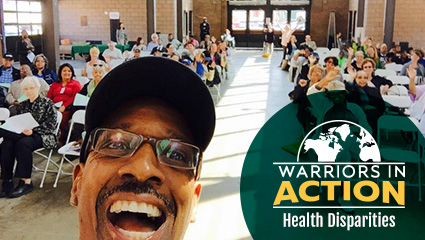 Over the coming months, look for videos, stories and events that feature some of the many Wayne State initiatives and passionate individuals committed to eradicating health disparities. This content is part of WSU's Warriors in Action campaign highlighting how Wayne State is making a difference.
Over the coming months, look for videos, stories and events that feature some of the many Wayne State initiatives and passionate individuals committed to eradicating health disparities. This content is part of WSU's Warriors in Action campaign highlighting how Wayne State is making a difference.
Detroit is transforming into an all-purpose destination where residents can live, work and play. Despite the positive changes being made to the city, residents are still being exposed to environmental stressors which may affect their everyday health. Studies show that diseases such as obesity, diabetes and asthma are often acute in urban areas like Detroit.
As leaders pave the way to an economically healthy Detroit, The Center for Urban Responses to Environmental Stressors (CURES), seated at Wayne State University, aims to also pave the way to a physically and mentally healthy city.
CURES, a program of the Wayne State University Institute of Environmental Sciences, researches environmental stressors which may trigger specific diseases such as cancer, diabetes, heart disease, and liver disease. They also aim to learn what the effects of these stressors have on residents’ immune system, as well as mental health.
CURES is rooted in the idea of community engagement with Detroit residents. Serving as a resource for environmental health information and expertise, it is necessary for members of CURES to foster collaborative relationships with Detroit residents, leaders and stakeholders.
CURES Director Dr. Melissa Runge- Morris said that working hands-on with residents, clinicians and community leaders makes the center more aware of what is important to Detroit residents. Engagement with the Detroit community is the cornerstone for the CURES center.
“We have not traditionally trained scientists or clinicians to interface with the community,” said Morris. “But that’s the thing about environmental research — the community is your patient.”
Brian Smith, the community engagement coordinator for CURES, said the program aims to promote positive lifestyle changes to Detroit residents.
“We’re not expecting residents to become health advocates overnight,” said Smith. “But we do want residents to be aware and mindful of the health issues that may be in their area.”
For more information about the Center for Urban Responses to Environmental Stressors, please visit lehs.wayne.edu.
The CURES program is open to all interested Wayne State students. Interested students should contact Dr. Melissa Runge- Morris at mrungemo@med.wayne.edu.
